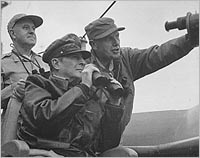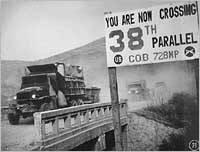 |
 |
 |
|||
 |
Home | Cold War Turns Hot | The Armed Forces Integrate | What the Experts Say | |||
|
The Cold War Turns Hot
Decisive Moment
"Luckily the opposition at Inchon was not severe. The North Koreans only had about two thousand second-rate troops there," recalls Edwin Howard Simmons, a retired Marine brigadier general who was then a company commander with the 1st Marines. The landing surprised the North Korean Army, which was then massed a hundred miles south, pressing down on Allied forces around Pusan. "It literally turned the battlefield around and put us at the enemy's flank and in his rear," says Simmons. "The 8th Army came out of the Pusan Perimeter, attacked to the north, and essentially, by that time, the North Korean army was broken." Within two weeks, the U.N. had taken back Seoul and restored the South Korean government in its capital. The North Koreans had retreated across the 38th Parallel into their own territory. Now, U.S. leaders faced a crossroads. "This is the decisive moment in the Korean War," says historian Roy Flint. "The Americans had a choice. And I say the Americans because they're calling the shots militarily for the United Nations. Should we cross the 38th Parallel?" In other words, U.N. forces could declare victory and go home, having chased the aggressors out of South Korea. Or they could push northward, finish off the North Korean army, and try to reunite the peninsula. Urged on by MacArthur and the Joint Chiefs of Staff, Truman adopted the new, more ambitious war aim. Some of Truman's advisers feared disaster - with good reason. "If you look at the map," says Flint, "they're going to invade across the 38th Parallel into an expanding, fan-shaped peninsula, which is going to stretch the Korean and American forces thinly at best while that force is advancing toward the Chinese border!"
That is, hundreds of thousands of Chinese soldiers were crossing into North Korea under the cover of night to wait for the Americans. Frank Miller would be wounded fighting them. Next: "Too Much to Ask"
|
||||

